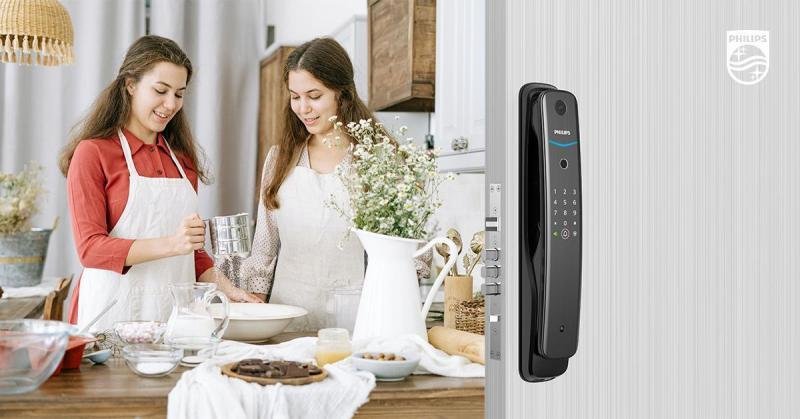In this age of advanced technology, smart locks have become a practical option for today’s homes. These smart gadgets can be controlled from a distance, are compatible with existing home automation infrastructure, and provide additional layers of protection. The security benefits of smart locks outweigh their convenience.
From hacking to hardware failure, this essay explores the risks associated with smart locks and highlights the need for due diligence while making your choice. Because of their superior encryption, user-friendly design, and dedication to home security, Philips smart locks have quickly become the go-to option for retailers and resellers.
What are Security Concerns of Smart Lock?
Smart locks, which provide a more modern and easy alternative to older keyed entry systems, have grown rapidly in popularity in recent years. Although smart locks provide several advantages, such as remote access control and improved security features, users should be aware of serious vulnerabilities.
- Threats to Cyber Security:
Since smart locks may be accessed via the web or local networks, they can be hacked or otherwise compromised. Software flaws allow hackers to bypass the lock and get access. This threatens not just your possessions but also your privacy and identity.
- Low-Strength or Default Passwords:
Many people don’t bother changing the factory-set passwords on their smart locks, making them easy targets for burglars. Weak passwords may be readily broken into, and reusing the same password across many devices is risky.
- Attacks against Wi-Fi and Bluetooth:
Bluetooth or Wi-Fi connections are often used for remote access in smart locks. Hackers may access your property by intercepting and tampering with these signals.
- Backup Systems and Power Failures:
To work, smart locks often need electricity. There is a risk of being locked out or exposed if the lock stops working due to a lack of power or a technological glitch. Depending on their handling, backup features in certain models, such as physical keys or backup batteries, might provide security risks.
- Confidentiality of Information:
Access logs and user details are only two examples of the data collected by smart locks. This information might be misused or abused. Bad actors might use this data for intrusion or other nefarious purposes.
- Threats to One’s Physical Safety:
Some smart locks may be susceptible to manipulation or forceful entry due to physical flaws.
Users may reduce these risks by following these measures:
- Lock firmware should be updated regularly to fix security flaws.
- Always make use of different, robust passwords and turn on two-factor authentication.
- Take advantage of encryption software and methods to safeguard your home network.
- Keep track of who has used the lock and when.
- Limit who has access and be wary about giving out passwords.
Researching reliable brands, reading user reviews, and thinking about models with extra security certifications are all important steps when selecting a smart lock. To get the full advantages of smart locks without threatening your safety, it is essential to be watchful and solve these security problems.
What are Privacy Concerns of Smart Lock?
Smart locks have become more popular due to their increased convenience and safety. While there are obvious advantages to using such gadgets, there are also major privacy problems. Anyone considering installing a smart lock should read up on these issues beforehand.
- Gathering Information:
Smart locks can track who comes and goes from your house and the times and frequencies of these events, thanks to their built-in sensors and network connection. Privacy issues arise because the maker of the lock, or others, might keep and use this information.
- Possibility of Abuse:
Smart locks pose privacy risks due to the information they gather. This sensitive data may be compromised if hackers access the manufacturer’s systems. This information may also be used for targeted advertising or sold to other parties.
- Access Permissions:
Homeowners may provide access to others, such as friends, relatives, or repairers, with the help of many modern smart locks. This is a handy function, but it raises privacy problems if it needs to be done improperly. Your safety and privacy may be at stake if you have access to anyone who would abuse it.
- Remote Activation:
One of the modern smart locks’ best features is their ability to operate remotely. This functionality, however, may be misused if it is not properly safeguarded. An intruder might unlock your door and enter your home if they gain access to the software that controls your smart lock.
- Threats of Hacking and Weaknesses:
Smart locks are hack able, just like any other internet-connected gadget. Access to your smart lock might let an intruder inside your house or allow them to change your security codes.
It’s vital to take the following safety measures to resolve these privacy concerns:
- To keep your smart lock secure, you should update its software often.
- Protect your smart lock accounts with complex passwords and two-factor authentication.
- It would help to use caution when authorizing smart lock applications to access sensitive information.
- Keep an eye on the information your smart lock is sending out.
- Do your homework and choose smart locks certified as secure by a trustworthy organization.
As a result, smart locks have many benefits, but users should be mindful of the privacy risks they pose. Individuals may find a happy medium between the advantages and privacy issues of smart locks by taking the necessary steps and informing themselves about possible hazards.
What are the Risks Associated with Smart Locks?
Due to its usefulness and compatibility with other smart home features, smart locks have become more common in recent years. Users should be aware of the dangers and vulnerabilities associated with their usage. Key risks of using smart locks include:
- Concerns about Attack and Cyber security
- Hackers may get access to your house with a smart lock.
- Software flaws in smart locks compromise security since they allow unauthorized access via the lock.
- Problems with Reliability and Technology
- Because they need energy to function, smart locks can’t be used if the power goes out. The availability of backup methods, such as spare keys or batteries, is crucial.
- Locks may become unusable if their mechanical components fail. Preventative maintenance is essential.
- Data Protection Fears
- Some smart locks save user information, and there’s always a chance that it may be abused or compromised.
- Granting access to close friends and family or service providers might raise privacy issues if not handled appropriately.
- Examples and Case Studies
- The dangers of certain smart locks and their weaknesses have been brought to light by actual instances.
- Customers’ stories of technical difficulties and failed locks highlight the need for dependability.
- Guidelines for Effective Risk Avoidance
- Maintaining the smart lock’s software up-to-date helps fix security flaws that may be discovered in older versions.
- Improve security by switching on two-factor authentication and only using strong, unique passwords.
- Keep track of who has used your smart lock and remove their access if they shouldn’t have it.
- Be wary of providing sensitive information to the smart lock maker.
- Tips for Buying a Reliable Smart Lock
- Choosing a reputable manufacturer, such as the Philips smart lock manufacturer, will help lessen the likelihood of security flaws.
- Look for smart locks independently verified as secure by reputable organizations.
- Learn from the experiences of others and the insights of professionals by reading reviews and opinions.
In the end, smart locks have advantages, such as convenience and increased security, but they also pose threats that users must face. To improve security and dependability, it is important to be aware of these threats, to implement best practices for mitigating them, and to make educated decisions when buying a smart lock, such as by evaluating the smart lock manufacturer Philips.
Final Thoughts
Smart locks have unquestionable benefits, such as ease and connection, but they also present certain hazards. Users should proceed cautiously while adopting these gadgets due to the prevalence of possible vulnerabilities, hacking, and technical failures.
However, it is important to note that some smart locks are different. The Philips smart lock is a dependable and safe alternative for shops and resellers among the many available choices. It’s a great option for individuals who want to balance convenience and security in the world of smart locks thanks to its high-quality security features and reliable manufacturer.




